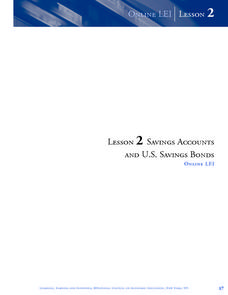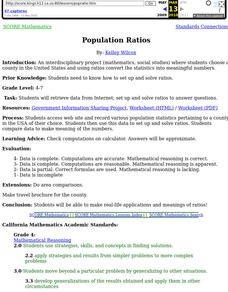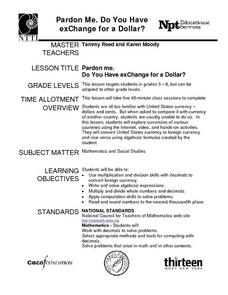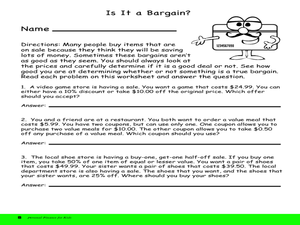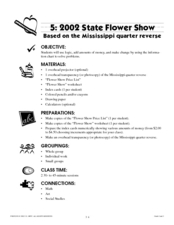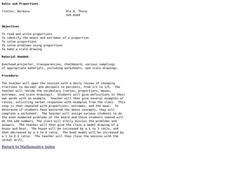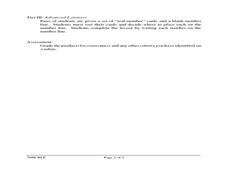Curated OER
Lesson 2: Savings Accounts and U.S. Savings Bonds
Young scholars explore the importance of savings accounts and U.S. Savings Bonds. They study the concept of simple interest through a math activity.
Curated OER
Population Ratios
Students access web site and record various population statistics pertaining to a county in the USA of their choice. They use this data to set up and solve ratios. They compare data to make meaning of the numbers.
Curated OER
Using Circumference
Learners participate in a activity that covers the concept of finding the circumference of a circle. The teacher covers relevant vocabulary with the students. They work in groups to measure objects and calculate the formula to find the...
Curated OER
Pardon Me. Do You Have Change For a Dollar?
Upper elementary and middle school learners explore currencies from a variety of countries. They use the Internet, video, and engage in hands-on activities. They practice converting U.S. currency to foreign currency and vice versa. This...
Noyce Foundation
Truffles
Knowing how to scale a recipe is an important skill. Young mathematicians determine the amount of ingredients they need to make a certain number of truffles when given a recipe. They determine a relationship between ingredients given a...
Curated OER
How Do You Spend Your Money?
Fifth graders examine ways to save and spend money. They look at ways that people earn, save, and spend money using chapters from Tom Birdseye's Tarantula Shoes. They add and subtract decimals to fill in a worksheet entitled, "Is It a...
Curated OER
2002 State Flower Show
Here is another State Quarter lesson. This one uses the Mississippi State Quarter. Pupils utilize beautifully-designed worksheets embedded in the plan, to practice calculating which combinations of flowers they can afford to buy. They...
Curated OER
Foreign Miners
Young scholars examine primary source documents from miners who went to California in the search of gold. They compare and contrast the letters they read and discuss what types of discrimination still exists today.
Curated OER
California Gold Rush
Students discover the people who lived in California before and after the gold rush. They use primary source documents to identify how the finding of gold changed the area. They also discover the discrimation that was present during the...
Curated OER
Buggin' Out (Identifying and Adding Amounts of Money)
Learners explore consumer math by participating in estimate exercises. In this currency lesson, students identify and define each piece of U.S. currency and their value to the monetary system. Learners complete several money worksheets...
Curated OER
What's All this Money Madness?
Second graders examine the value of money. In this money instructional activity, 2nd graders read the book Money Madness by David A. Alder and watch Brain Pop Jr. videos. Students discuss why we need money and how people earn money....
Curated OER
Slope Fields
Students create and analyze slope fields. In this calculus lesson, students create a visual of differential equations. They use the Ti Navigator to create slope fields.
Curated OER
Short-Term and Long-Term Savings Goals
Fifth graders discover how saving money can apply to their lives. In this personal finance lesson, 5th graders use the book The Leaves in October, as a conversation starter on income, savings and setting goals. Students explore the...
Curated OER
Ratio and Proportions
Students explore the means and extremes of a proportion, the how to make a scale drawing.
Curated OER
Not Everything is More Expensive
Students explore percent increases and decreases. They calculate the percent increase and decrease. Students use math to solve problems and communicate. They apply the given formula for percent increase/decrease.
Curated OER
Ordering Fractions and Decimals
Students place fractions and decimals with unlike values in correct numerical order.
Curated OER
Real Number Sense
Fifth graders put each number they receive in the appropriate order in a number line or a number circle. In this numbers lesson plan, 5th graders develop number sense and manipulate the numbers in order.
Pennsylvania Department of Education
Seeing Doubles
Pupils work with dominoes to recognize the number of spots on each side as they relate to addition facts. In this seeing doubles instructional activity, students make triangle shaped flash cards for the double facts. Pupils represent the...
